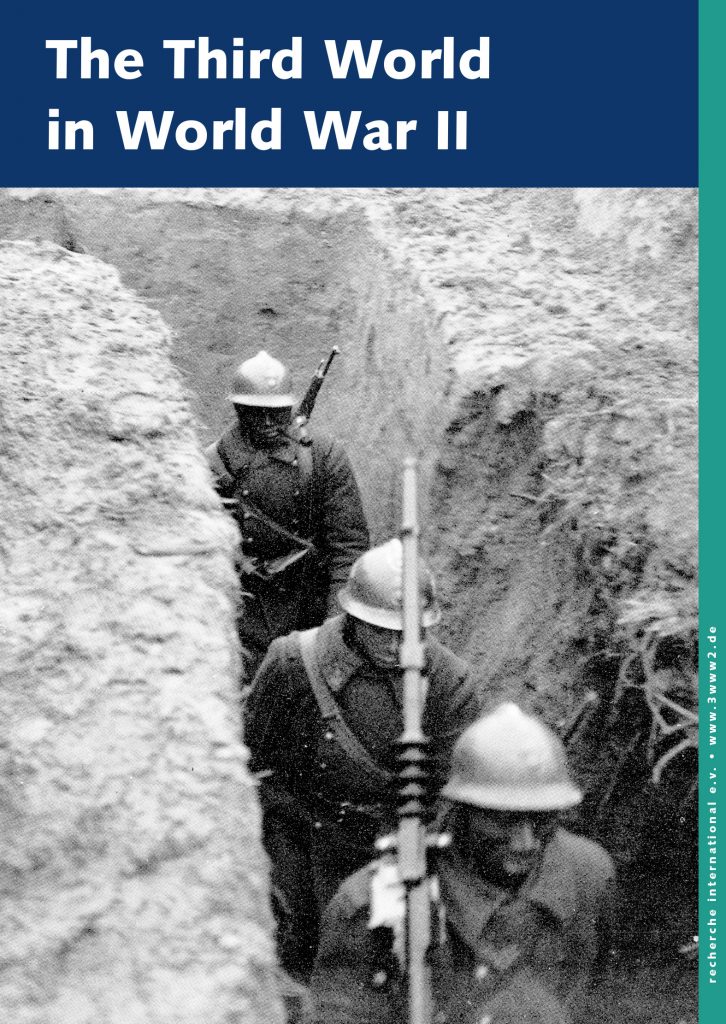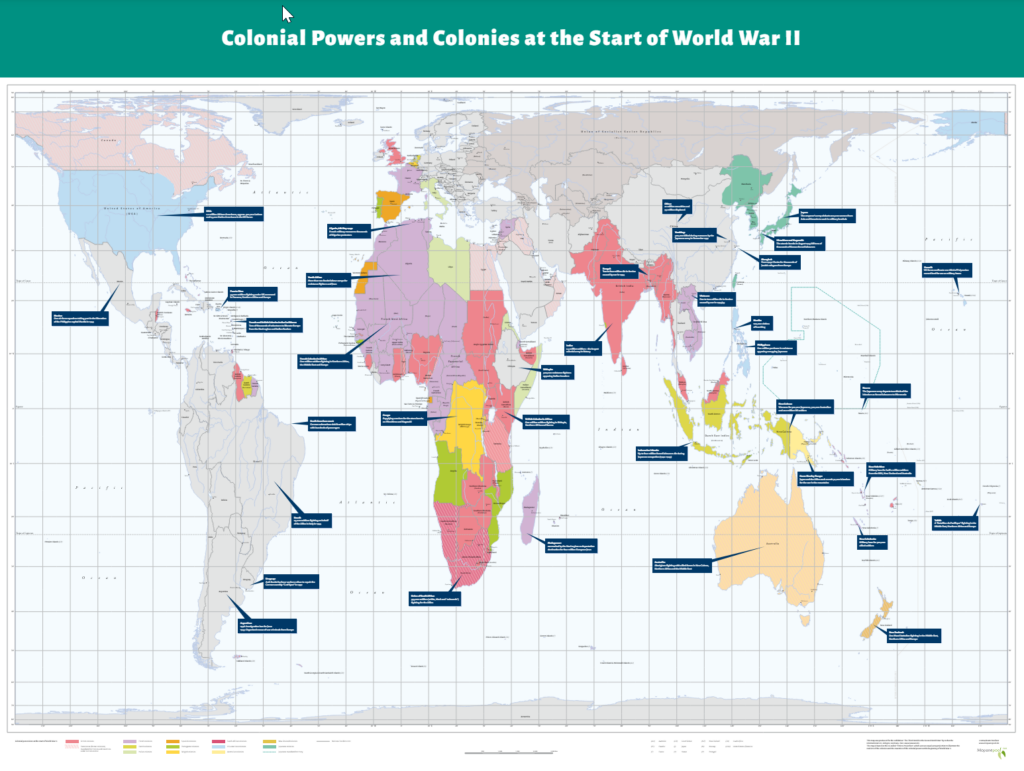
A long term project for a decolonised history of WWII
Contact:
Recherche International e.V., Cologne, Germany
℅ Karl Rössel, Kuenstr. 35, 50733 Köln
Tel: ++49 (0) 221 – 239714
E-Mail: karl.roessel@rjb-koeln.de
Download the exhibition as a booklet in PDF format
For more than 20 years a collective of freelance scientists and journalists, based in Cologne, Germany, has been trying to overcome the eurocentric views on the history of World War II, supported by a group of researchers called “recherche international e.V.”.
The book “Our victims don’t count” (2005 – 2019)
The first result of the research in 30 countries of Africa, Asia and Oceania over a whole decade was the publication of the book “Unsere Opfer zählen nicht – Die Dritte Welt im Zweiten Weltkrieg“ (“Our victims don’t count – The Third World in World War II”) in 2005. The book was selected by 24 critics in Germany as the most important non-fiction book of the month when it was released and it received dozens of positive reviews underlining that it finally describes an – until now – almost forgotten chapter in the history books on WWII. After four hard cover editions the Federal Agency for Civic Education published two more paperback editions in 2015 and 2016. A third paperback edition followed in 2019. The German version of the book: here
Educational book (2008 / 2012)
In 2008 a special educational edition for teachers and schoolchildren was published in German, followed by a corrected and extended version in 2012.
The German version of the instructional material: here
The German version of the exhibition (2009 – 2020)
IIn 2009 an exhibition on the forgotten role of third world countries and (their) people was presented for the first time in Berlin and was shown throughout more than 70 locations in Germany and Switzerland and in three different sizes (A0, A1 and A2).
It has been shown in historical museums, documentation centers for Nazi history, schools and universities and there are further bookings of this exhibition.
Locations of the A0-Version of the exhibition: here
Locations of the A1-Version of the exhibition: here
Locations of the A2-Version of the exhibition: here
Photos of the exhibition and guest books from several locations: here
The content of the exhibition
The exhibition is based on the book “Unsere Opfer zählen nicht”, which is therefore also used as a catalogue.
The exhibition has 8 chapters:
- Prologue: A Short Introduction
(with a video installation called “forgotten liberators”, which shows portraits of 200 men and women from third world countries, who fought against the facist powers as well as a world map of the colonial powers and the colonies at the beginning of WWII).
This is followed by the three main chapters of the exhibition: - Africa in WWII
- Asia in WWII
- Oceania in WWII
The last, smaller geographical chapter is: - South America and the Caribbean in WWII
and followed by two thematic chapters: - The persecution of Jews outside of Europe
- Collaboration
- Epilogue
(with a statement of Prof. Kum’a Ndumbe titled: “The right to remembrance”)

Large version of the World Map as PDF here.
Chronology of the long-term project 1985 – 2005
English version of the exhibition for South Africa
In 2016, an English version of the exhibition was produced (size A1).
In January 2017, it was sent to South Africa to be presented in different cities over several years, the premiere taking place on February 28, 2017 in the Castle of Good Hope in Cape Town. It was shown in Cape Town till June, from July 2017 onwards in Pretoria (Freedom Park), from January 2018 in Johannesburg (Holocaust & Genocide Centre) and from mid-2018 to mid-2019 in the Steve Biko Centre in King Williamstown. From October 2019 till March 2020, the exhibition is presented by the Desmond & Leah Tutu Legacy Foundation in Cape Town.
Presentations in further cities in South Africa might follow.
(See: Places and dates of the exhibition in South Africa) recherche international hopes, that the exhibition will also tour to other anglophone countries in Africa and elsewhere.
Table of content of the exhibition in English: here
Setting up the exhibition – instructions here
Content of the flight case for the English exhibition: here
Photos of the flight case of the exhibition: here
Instructional material: Work Sheets for Students & Teachers Answer Sheets: here
Posters to annouce the exhibition in South Africa: here
Presentation of the exhibition in South Africa by ANC-veteran Denis Goldberg: here
Live Performance of MOMENTS IN A LIFE (autobiographical essays) by Denis Goldberg (initiator of the exhibition in South-Africa) set to music and performed at the Stellenbosch Chamber Music Festival in July 2016: here
Website of Denis Goldberg: www.denisgoldberg.org
Bio of Karl Roessel, curator of the exhibition here
Reactions and critics
As for the books on the subject the reactions of visitors of the exhibition in Germany and in Switzerland also were overwhelmingly positive, as can be seen in the guest books from different cities.
People were mostly astonished, if not shooked about the facts on colonial history in WWII of which they had never heard before; most history books do not even mention them. .
The only negative criticism of the exhibition came from a few people, who cannot cope with the fact that the exhibition also mentions collaborators of the fascists in different continents. But in more than 60 places where the exhibition was shown, these critics were only a small minority.
The website www.3www.de
This website was created to accompany the exhibition, which provides background information and recommendations (films, literature etc.) for all those interested in the subject and in presenting the exhibition.
The historical background
Most standard history books on World War II contain lists of casualties, which do not include those from Africa, Asia, Latin America and Oceania. Some statistics even fail to mention those millions of people who died in China during World War II.
For more than 60 years the number of victims from the Third World that this war caused has nowhere been investigated systematically, the main reason being that most of the countries concerned were then still under European, American, or Japanese tutelage or control. Their casualties were lumped together with the victims of the colonial powers (and thus reduced significantly), or they were simply never counted.
This is all the more appalling since World War II was fought in many Third World countries. Many historians at best mention black soldiers in World War II as exotic footnotes – be they „Senegalese bowmen“ from West Africa or Australian Aborigines. Usually, veterans from the colonies are not invited to attend V-Day celebrations. And until today, they normally do not receive veterans‘ pensions, or if they do, they just make up a fraction of „white“ soldiers‘ pensions. The French government still pays the equivalent of ten U.S. dollars per month to an ancien combatants from Dakar, Senegal, who had been fighting for four years in the French army in Europe.
English edition of the book
The book “Unsere Opfer zählen nicht” is the first publication, which gives an overview about the millions of people in the former colonies who served, suffered and died in World War II . There are talks with a publishing house in Great Britain which might be interested in publishing an English edition of the book.
Recherche International e.V. hopes to also be able to produce versions of the book and the exhibition in other languages so that they can be presented in most of those countries in Africa, Asia and Oceania , from where the forgotten victims came. For copies of the English version of the exhibition,
please contact:
recherche international e.V.
